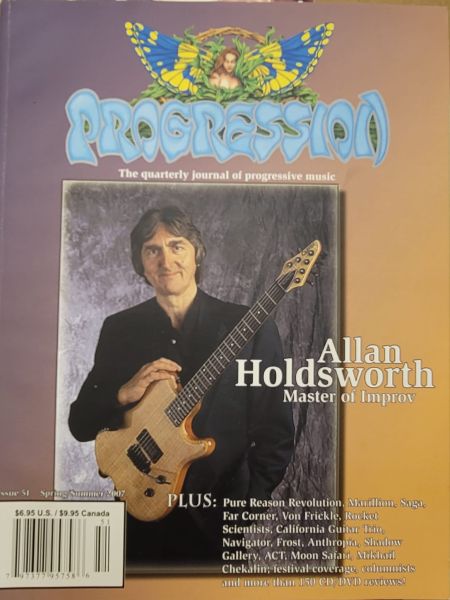The Six-Stringed Perfectionist (Progression 2007)

The Six-Stringed Perfectionist
Progression Magazine #51, Spring/Summer 2007
By John Collinge
Progression magazine ran an article in Allan in 2007, which contains a career overview, as well as an interview. As the back issue is still on sale, we only provide a summary of the contents of the interview.
FUSION AND PROGRESSIVE ROCK: Allan doesn't strongly identify with fusion or progressive rock. He dislikes much fusion music, preferring improvisation-focused compositions, and finds labels like "fusion" and "jazz" limiting.
IMPROVISATION: Allan finds improvisation more challenging and fulfilling than playing composed music. He values the unpredictability of each performance, though he often feels disappointed in his playing, rarely feeling satisfied. He believes audiences can sense when he's struggling, but occasionally experiences "good nights" that keep him motivated, despite them being rare.
Allan explains his six-year album delay due to personal issues, including divorce and losing his studio. He's now finishing old tracks and hopes to release new music later this year. His creative process varies. He improvises daily, sometimes studying specific techniques, and develops compositions over time, with some tunes quickly forming, others taking much longer.
Allan primarily uses Carvin guitars, sometimes custom headless ones, and still relies on the SynthAxe in the studio. His live setup is more compact due to travel constraints.
Allan values collaborative freedom, allowing musicians to interpret his compositions freely. He’s happy with his current band, particularly Chad Wackerman and Jimmy Johnson, and admired Michael Brecker. At 60, he feels discomfort playing electric guitar, associating it with youth, though he loves music and can’t imagine quitting, despite occasional doubts about his image. Allan feels he's still progressing as a musician and continues to improve. While flattered by his influence on other guitarists, he prioritizes personal growth and self-expression.
Allan reflects on playing with Tempest, Soft Machine, UK, Gong, and Bruford, appreciating creative freedom, collaboration, and evolving musical journeys across different bands.
Allan accepts criticism of his music without offense, acknowledging art's subjective nature, even from friends who dislike his work passionately.
Allan finds inspiration in science fiction's imaginative possibilities, linking it to his music creation. He prefers thought-provoking films over real-life dramas.